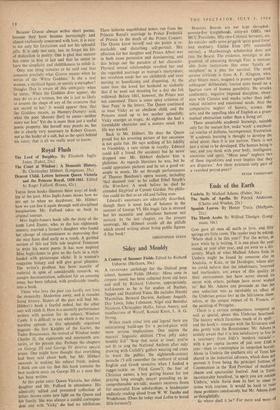Sidey and Mouldy
A Century of Summer Fields. Edited by Richard Usborne. (Methuen, 30s.)
A CENTENARY anthology for the Oxford prep school, Summer Fields (Motto: Mens sana in corpore sano), has been collected from old boys and staff by Richard Usborne, appropriately, well-known as he is for studies of Buchan, Sapper and Dornford Yates. He includes Harold Macmillan, Bernard Darwin, Anthony Asquith, Day Lewis, John Lehmann, Nigel and Benedict Nicolson, Christopher Hollis, Julian Amery, and recollections of Wavell, Ronald Knox, L. A. G. Strong.
Within much tribal lore and legend there are entertaining build-ups for a period-piece with more serious implications. One enjoys the masters' linguistic • abilitiei (Ton jolly sidey mouldy kid.' Stop that noise at once; you're not fit to sing the National Anthem after only drawing with Cothill'); golfers wearing red coats to warn the public; the eighteenth-century panache CI still remember the outburst of mixed English and Greek invective when I funked a rugger-tackle on Third Game'); the fear of Christian names; a boy getting beaten for not praying long enough; prayer preceding an in- comprehensible sex-talk; masters receivers fivers for successful Eton scholarships; a headmaster endlessly reading aloud from W. W. Jacobs and Wodehouse. (Does he today read Lolita to bored fifth-formers?) Honours Boards are not kept shrouded: seventy-five knighthoods, sixty-six OBEs, twc MCC Presidents, fifty-two Colonial Servants, etc An outsider sniffs some priggish 'quiet good form and snobbery. Unlike Eton (951 successful entries), a Marlborough scholarship does not rate the Board: The evidence, nostalgic or dis- gruntled, of educating through Fear is inexcus- able from institutions that enter 'family at- mosphere' as a plea for survival. The most serious criticism is from A. F. Alington, who, after fifteen years, resigned in protest against his colleagues' deliberately limited aims based on a Spartan view of human possibility. He attacks conformity, negative imposed discipline, obses- sion with Classics and marks rather than indi- vidual initiative and emotional needs. Also the comparative neglect of history, science, the arts; and the appalling idea of English as a gram- matical abstraction rather than a living art.
These unsuitable academic learnings, suitable only for the mature few, make 'work' a mechani- cal routine of dullness, incompetence, frustration. 'If academic learning is thought to develop the mind alone, then it is too narrow. There is not just a mind to be developed. The human being is one, and you think with your body, intelligence, emotions and spirit. "Mens sana" neglects two of these ingredients and even implies that they are disparate.' Are these strictures only part of a vanished period-piece?






























 Previous page
Previous page